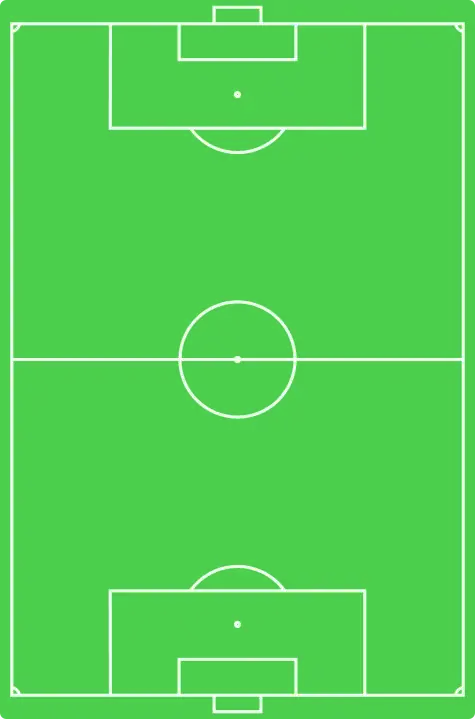History of the Lebanon national football team
The history of the Lebanon national football team dates back to 1934, when Lebanon played its first game against Romanian side CA Timișoara (T.A.C.) in Beirut. The national team, also referred to as "the Cedars", represents the nation of Lebanon in international football. It is fielded by the Lebanon Football Association and competes as a member of AFC.
Lebanon participated twice in the Asian Cup: in 2000, when they hosted the event, and in 2019. The national team has also competed in other continental and regional competitions, such as the WAFF Championship, the Arab Nations Cup, the Pan Arab Games, the Asian Games and the Mediterranean Games.
Timeline
1933–1957: The beginning
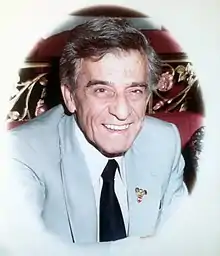
On 22 March 1933, representatives of thirteen associations gathered in the district of Minet El Hosn, Beirut, to form the Lebanese Football Association,[1][2] with Lebanese journalist Nassif Majdalani helping in its formation.[3] It joined FIFA in 1935 and the Asian Football Confederation (AFC) in 1964.[2][4]
On 27 January 1934, Beirut's International team lost to the varsity team of the American University of Beirut (AUB) 5–1.[5] The following month, a Beirut team composed of AUB varsity and Renaissance athletes played two matches against the Romanian side CA Timișoara (T.A.C.) at home.[6][3] The first match, on 18 February at the Edmond Rubeiz Field, ended in a 1–9 defeat; the second, played two days later at the University Field, was a 1–4 loss.[7] The unofficial matches are regarded as the national team's first.[8] The All-Beirut Team lost again to T.A.C. on 21 November 1935 at the Varsity Field.[9]
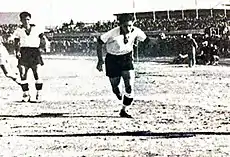
Beirut XI, representing Lebanon, played its first game against Syria (Damascus XI) in 1939 at the Habib Abou Chahla Stadium; the match ended in a 4–5 loss.[3] The team played 17 unofficial games against Damascus XI until 1963, winning nine, drawing two and losing six.[3] The national team's first official FIFA game was a 5–1 loss to Mandatory Palestine on 27 April 1940,[10] with Kamil scoring Lebanon's first official international goal.[11] In 1944, Lebanon lost to an unofficial Iraq national team representing Iraq's Ministry of Education and coached by George Raynor.[3]
During the 1950s, Lebanon was coached by Vinzenz Dittrich[12] and Ljubiša Broćić.[13] The side played three official games, only managing one draw, against Syria in 1953.[10] The team also played unofficial games against top-level European clubs such as Dynamo Moscow, Leipzig and Spartak Trnava in 1957.[3] Lebanon played Energia Flacara Ploiesti the same year in the opening game of the Sports City Stadium. The match ended 1–0 to Lebanon thanks to a Joseph Abou Murad goal.[14]
1957–1979: Early history
From 19 to 27 October 1957 Lebanon hosted the second edition of the Pan Arab Games, and were drawn with Saudi Arabia, Syria and Jordan in the group stages.[15] After two 1–1 draws against Saudi Arabia and Syria, Lebanon defeated Jordan 6–3 in their first official international win thanks to two braces by Joseph Abu Murad and Mardek Chabarian and one goal each by Robert Shehada and Levon Altonian; this placed them first in their group. In the semifinals, Lebanon lost 4–2 to Tunisia. They finished in third place, however, since Morocco withdrew from the third-place match.[15]
In 1958, Joseph Nalbandian was appointed coach of the national team.[16] He was one of Lebanon's most successful coaches, winning eight of 22 official matches during his 11-year tenure. Under Nalbadian, Lebanon hosted the 1959 Mediterranean Games and were grouped with Italy B and Turkey B.[lower-alpha 1] They finished last in the group, after four losses to the two European teams.[17]
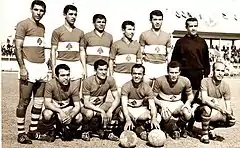
In 1963 Lebanon hosted the inaugural edition of the Arab Cup, and were grouped with Tunisia, Syria, Kuwait and Jordan.[18] They won their first match against Kuwait 6–0, thanks to a hat trick by captain Levon Altonian. This tied Lebanon's biggest win to date, a 7–1 victory against Saudi Arabia in 1961.[19] After another win (against Jordan) and two losses (to Syria and Tunisia), Lebanon finished third in the tournament. In the following edition, in 1966, Lebanon was drawn with Iraq, Jordan, Kuwait and Bahrain in Group A. After three wins and a draw, they qualified to the semi-finals against Syria, where they lost 1–0. In the third-place match Lebanon lost 6–1 to Libya, finishing the competition in fourth place.[20]
Their first Asian Cup qualifying campaign was in 1971, coached by Joseph Abou Murad.[16] In the first round they lost to host Kuwait 0–1, but defeated traditional rival Syria 3–2 to qualify for the next round. In a decisive semi-final match against Iraq, Lebanon lost 1–4 and was eliminated.[21] Despite the country's civil war, Lebanon appeared in the 1980 AFC Asian Cup qualifiers held in Abu Dhabi; however, with one win, one draw, and one defeat, Lebanon came third in their group were eliminated.[22]
1993–2004: Post-Civil War
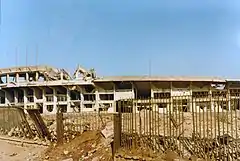
Lebanon's first official World Cup qualification after the war was in 1993, with Adnan Al-Shargi their coach.[23] After two wins, two losses and four draws, Lebanon finished third in its group and was eliminated.[24] Under Terry Yorath, the team's first foreign manager since the war, Lebanon began its first post-war campaign to qualify for the 1996 AFC Asian Cup. Despite winning twice against Turkmenistan and losing only once (at home, against Kuwait), Lebanon was eliminated from the competition with a one-point difference with Kuwait (the group leaders).[25]
Lebanon drew into a group which included Kuwait and Singapore in the 1998 FIFA World Cup qualifiers. Led by Yorath, the Cedars were eliminated with only four points.[26] The Welsh manager was one of the team's most successful managers, however, winning 13 out of 27 official matches during his two-year tenure.[19]
Lebanon hosted the 2000 AFC Asian Cup, despite FIFA concerns about stadium conditions.[27] Under Croatian coach Josip Skoblar,[28] Lebanon, captained by Jamal Taha,[29] drew into Group A with Iran, Iraq and Thailand. Lebanon played their first Asian Cup game against Iran on 12 October 2000 at the Camille Chamoun Sports City Stadium with 52,418 spectators. Trailing by one goal at half time, Lebanon conceded three further goals in the second half to end their first group stage match in a 0–4 defeat. In the second match, against Iraq, two goals in the first 22 minutes gave the opposing team a comfortable lead. However, an Abbas Chahrour goal in the 28th minute, Lebanon's first in the competition, and a goal by Moussa Hojeij in the 76th minute gave Lebanon their first point of the competition. Lebanon played Thailand in the final group stage match. With the opposing team gaining the lead at the 58th minute, Luís Fernandez equalized for Lebanon to end the match 1–1. However, the point was not enough as they finished last in the group, with only two points.[30]
Managed by Theo Bücker, Lebanon drew with Pakistan, Sri Lanka and Thailand in the first round of the 2002 World Cup qualifications. The team, with good offense from Roda Antar, Haitham Zein, Wartan Ghazarian and Gilberto dos Santos, finished second in their group with 26 goals in six games (the most in their group).[31]
Under Richard Tardy,[32] Lebanon drew into Group D of the 2004 AFC Asian Cup qualifiers.[33] Before the match against North Korea, the Lebanese team was reportedly ill-treated; hotel conditions were poor, and their training field contained goats and sheep.[34] Lebanon finished third in their group, with four points.[33] For the second round of the qualifiers for the 2006 World Cup, Lebanon were grouped with South Korea, Vietnam and Maldives. Under Mahmoud Hamoud, they finished second in their group and were eliminated.[35]
2006–2014: Failed qualifications and match-fixing
Lebanon drew into Group D for the 2007 AFC Asian Cup qualifying campaign with Australia, Bahrain and Kuwait.[36] The scheduled meeting of Australia and Lebanon made Buddy Farah, an Australian player of Lebanese descent, declare his return to the Lebanese national side.[37] Before Lebanon's match with Bahrain on 16 August 2006, it was announced on 1 August that the Asian Football Confederation had accepted a withdrawal request from the Lebanon Football Association due to the 2006 Lebanon War, which forced several players to leave their homes to avoid the war.[38][39] In 2007 Lebanon was seeded in the first round of the qualifiers for the 2010 World Cup, where they faced India to qualify directly for the third round of the qualifiers. Lebanon won 6–3 on aggregate and advanced to the third round, with two goals by Mohammed Ghaddar in the second match.[40] Lebanon, grouped with Saudi Arabia, Singapore and Uzbekistan, finished last with no points.[41]
In April 2008, Lebanon and the Maldives (the two lowest-ranked teams in Asia)[lower-alpha 2][42] played home-and-away matches in the preliminary round of the 2011 Asian Cup; the winner would proceed to the next round. A 4–0 home win and a 2–1 victory in the away match advanced Lebanon to the qualifying round.[43][44] They drew into Group D with China, Syria and Vietnam, finishing last.[45] Emile Rustom, re-appointed as head coach, led Lebanon into the second round of the 2014 World Cup qualifiers. They faced Bangladesh, winning 4–0 in Beirut on 23 July and losing 2–0 in Dhaka five days later.[46][47] Lebanon advanced to the AFC third round, where they were grouped with South Korea, Kuwait and the United Arab Emirates. Rustom resigned less than a week later, citing internal administrative problems.[48][49][50]
On 4 August 2011, it was reported that Theo Bücker was Lebanon's new head coach.[51] The former national-team manager took the reins nine years after leaving that position, intending to "showcase Lebanese talent and give a good account of the country in the game."[52] On 6 September, Lebanon came back from one goal down to defeat the United Arab Emirates 3–1 in the Asian Cup qualifications; striker Mahmoud Khamees put the visitors in front after 15 minutes, Lebanon replied with goals from Mohammed Ghaddar, Akram Moghrabi and Roda Antar; Antar was named man of the match.[53][54][55]
They then lost 3–1 to Kuwait in Beirut on 11 October 2011;[56][57][58] 32,000 spectators were at the Camille Chamoun Sports City Stadium for the first time since 2005, when the LFA barred fans from the stadiums due to behavioural issues.[59] Bad fan behaviour (mainly fireworks-related) was again a problem against Kuwait, forcing referee Masaaki Toma to stop the game several times.[60] A month later, Lebanon defeated Kuwait 1–0 on a 57th-minute goal by Mahmoud El Ali at the Peace and Friendship Stadium in Kuwait City;[61] it was Kuwait's first home loss to Lebanon.[62] On 15 November, Lebanon hosted South Korea at Beirut's Camille Chamoun Sports City Stadium before over 40,000 spectators.[63] After four minutes, Lebanon took the lead on a goal by Ali Al Saadi. Eleven minutes later, Korea tied the score with a penalty kick. In the 30th minute, Lebanon received a penalty kick after Mahmoud El Ali was tackled inside the penalty area; Abbas Ali Atwi scored, giving Lebanon a 2–1 victory. Lebanon's first-ever win against South Korea qualified them for the fourth (and final) qualifying round for the first time.[64]
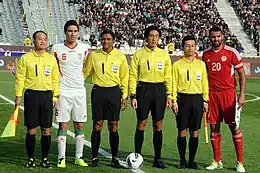
They drew into Group A of the round, with South Korea, Uzbekistan, Iran and Qatar.[65] Against Iran, a first-half Roda Antar goal gave Lebanon the lead in a match they were required to win to qualify for the 2014 FIFA World Cup. Antar rose above the Iranian defense to head home a free kick from Mohammad Haidar in the 28th minute. They held onto the lead, and won 1–0.[66] On 26 February 2013, team members Ramez Dayoub and Mahmoud El Ali were involved in the 2013 Lebanese match fixing scandal; they were accused of illegal betting on several matches involving Lebanese teams (including the national team), in addition to manipulating results.[67] The players were fined $15,000 and banned for life from the Lebanon Football Association.[68] The Lebanese team then lost to Uzbekistan 0–1 on the road.[69] In the following match they hosted South Korea in Beirut and led 1–0 until South Korea scored the equalizer in the 97th minute, eliminating Lebanon.[70]
The team drew into group B with Iran, Thailand and Kuwait for the 2015 AFC Asian Cup qualifications,[71] during which Giuseppe Giannini replaced Theo Bucker as head coach.[72] During Giannini's first game, on match day three, Mohammad Ghaddar scored the equalizer against Kuwait in Beirut to earn a point for Lebanon.[73] At the end of the qualifications, Lebanon and China were tied for third place; China had a better goal difference, however, and went to Australia.[71]
After the country's failed attempt to qualify for the 2015 AFC Asian Cup in Australia, the Lebanese Football Association decided to reform the national team in 2014 by modeling it on the Belgium national team (particularly Belgium's performance in the 2014 FIFA World Cup in Brazil).[74] Inviting new players from nations with a large Lebanese community (such as the United States, Germany, Denmark and Norway) would, it was hoped, bring about a rebirth of Lebanese football.[74] On 8 September 2014, Lebanon played an unofficial FIFA match against the Brazilian Olympic team in Doha for the first time; the match ended in a 2–2 draw. Maatouk scored a goal which would have given Lebanon a 3–1 lead, but the goal was incorrectly ruled offside; Brazil's equalizing goal was erroneously ruled onside.[75][76] The match excited the Lebanese people, despite poor refereeing.[75] After Lebanon's 0–5 loss to Qatar a month later,[77] Giuseppe Giannini was fired.[78]
2015–present: Radulović and Ciobotariu period
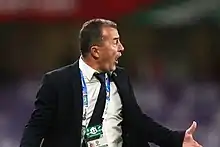
Miodrag Radulović was appointed the team's new coach in 2015,[79] and led Lebanon in the 2018 World Cup qualifications.[80] The team drew into a group including Asia's runners-up South Korea, Kuwait, Myanmar and Laos,[81] the second time Lebanon faced South Korea and Kuwait in World Cup qualifiers. Lebanon finished second in the group and, although they were eliminated from the World Cup, they played in the 2019 Asian Cup qualification third round.[82]
The Asian Cup draw put Lebanon in Group B, with North Korea, Hong Kong and Malaysia.[83] With five wins and a draw, Lebanon topped the group and qualified for the cup for the first time (after qualifying as host in 2000, the country's only previous participation).[84] Hassan Maatouk (who succeeded Roda Antar as captain in 2016)[85] was key to Lebanon's success, scoring five goals in six games.[86] Lebanon fielded a number of players of Lebanese origin who were born and raised in other countries during the qualifications, including Hilal El-Helwe, Joan Oumari and Omar Bugiel from Germany; Soony Saad from the United States;[87] Samir Ayass from Bulgaria, and Adnan Haidar from Norway.[88]
Although Radulović failed to qualify the team for the 2018 FIFA World Cup, he helped Lebanon qualify for their first-ever AFC Asian Cup in 2019;[82] he was the first Montenegrin manager to help a team qualify for a major tournament. Radulović managed a 15-game unbeaten streak[lower-alpha 3] (from 24 March 2016 to 11 October 2018),[89][90] winning eight and drawing seven.[19] In September 2018, Lebanon achieved their best-ever FIFA ranking (77th).[91]
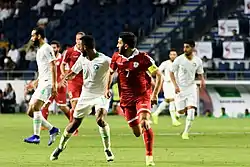
On 9 January 2019, Lebanon started their 2019 Asian Cup campaign with a 0–2 loss against Qatar.[92] In the 37th minute, Ali Hamam scored a goal for Lebanon from a corner, only for it to be disallowed for a dubious foul.[93][94] Two goals by Qatar in the second half secured all three points for the opposing team.[95] Three days later, Lebanon played their second match of the tournament against Saudi Arabia. Two goals without reply sentenced Lebanon to their second defeat of the tournament.[96]
In the final group stage game against North Korea, played on 17 January, Lebanon needed a win by four goals to pass to the knock-out stages. Lebanon conceded an early free-kick goal, before leveling the score in the first half through a goal by Felix Melki. Lebanon took the lead in the second half after Hilal El-Helwe scored from close range. Fifteen minutes later Maatouk converted a penalty kick, becoming Lebanon's joint top-scorer.[97] A fourth goal for Lebanon came in the seventh minute of added time, with El-Helwe scoring his second volley of the match, ending the encounter 1–4 and giving Lebanon their first ever Asian Cup win. However, they lost out to Vietnam in the third-place ranking on the fair play rule due to having received seven yellow cards against the five by Vietnam, and were knocked out of the competition.[98]
On 26 March 2019, the LFA announced that they would not renew Radulović's contract, terminating on 1 May 2019, and that they would be looking to replace him with another foreign coach in view of the qualifications for the 2022 World Cup and the 2023 Asian Cup.[99] Indeed, on 3 June 2019, Liviu Ciobotariu was appointed head coach of the national team.[100] His first games took place at the 2019 WAFF Championship, where Lebanon were drawn with hosts Iraq, Syria, Palestine and Yemen. After a 1–0 defeat to Iraq in the opening match of the tournament,[101] Lebanon won 2–1 against Syria thanks to a long-distance shot by Nader Matar and a 91st-minute goal by Moni.[102] However, a 0–0 draw to Palestine and a 2–1 defeat to Yemen weren't enough to reach the final.[103][104]
On 17 July 2019, for the 2022 World Cup qualification second round, Lebanon were drawn with South Korea, for the third time in a row, North Korea, who Lebanon had faced in both the qualifications and final stage of the 2019 Asian Cup, Turkmenistan and Sri Lanka.[105] Lebanon started their qualification campaign in September, with a 2–0 defeat to North Korea away from home.[106] The following month, Lebanon first hosted Turkmenistan, whom they beat 2–1,[107] before beating Sri Lanka 3–0 away from home.[108] In November, Lebanon hosted the following two games; the matches, against South Korea and North Korea respectively, ended in a 0–0 draw on both occasions.[109][110]
On 9 March 2020, both FIFA and the Asian Football Confederation (AFC) confirmed that the upcoming qualification games, scheduled to be played in March and June, had been postponed to later dates in response to the 2019–20 coronavirus pandemic in Asia.[111][112]
Kit history
- General information about the Lebanese team kit can be found here: Lebanon national football team#Kits
Kit sponsorship
| Kit supplier | Years |
|---|---|
| 1995–1996 | |
| 1996 | |
| 1997–2002 | |
| 2003–2006 | |
| 2007 | |
| 2008–2012 | |
| 2012–2013 | |
| 2013–2014 | |
| 2014–2015 | |
| 2015 | |
| 2015–present | |
| Source: FIFA Photos | |
Notes
- Both Italian and Turkish sides were made up of amateur players.
- After the withdrawal of North Korea, Myanmar and Turkmenistan, only Lebanon and the Maldives were involved in the preliminary round.
- The match played on 9 September 2018 against Oman, which ended in a 0–0 draw, was not considered official by FIFA.
References
- الإعلام الرياضي في لبنان بين شباك السياسة والإهمال [Sports media in Lebanon between politics and neglect]. الأخبار (in Arabic). Retrieved 20 December 2018.
- عساف, فراس ابو. لمحة عن الإتحاد [Lebanese Football Federation]. الاتحاد اللبناني لكرة القدم (in Arabic). Retrieved 20 December 2018.
- Mubarak, Hassanin; Morrison, Neil. "Lebanon – International Results – Early History". www.rsssf.com. Retrieved 7 October 2018.
- تاريخ تاسيس الاتحاد اللبناني لكرة القدم؟ [The date of the establishment of the Lebanese Football Federation?]. Elsport News (in Arabic). Retrieved 20 December 2018.
- "Athletic Notes" (PDF). Al-Kulliyyah. XX (1). American University of Beirut. 1 November 1933. pp. 89–90.
- "Roumanian team to visit Beirut" (PDF). Al-Kulliyah Review. I (5). American University of Beirut. 17 February 1934. p. 24.
- "They came, they played, they conquered" (PDF). Al-Kulliyyah. XX (4). American University of Beirut. 15 March 1934. p. 128.
- صقر, علي حميدي (1995). موسوعة كرة القدم اللبنانية [Lebanese Football Encyclopedia] (in Arabic). مؤسسة نوفل للتوزيع. ISBN 0000281247.
- "All-Beirut vs TAC" (PDF). Al-Kulliyah Review. 3 (4). American University of Beirut. 30 November 1935. p. 317.
- "World Football Elo Ratings: Lebanon". www.eloratings.net. Retrieved 5 December 2018.
- "British Mandate of Palestine Official Games 1934–1948". www.rsssf.com. Retrieved 6 April 2019.
- "Vinzenz Dittrich". rapidarchiv.at. Retrieved 5 December 2018.
- Rota, Davide. "Yugoslav Players and Coaches in Italy". www.rsssf.com. Retrieved 5 December 2018.
- "Our History – Camille Chamoun Sports City". Retrieved 3 January 2019.
- Hashim, Refel; Mubarak, Hassanin. "2nd Pan Arab Games, 1957 (Beirut, Lebanon)". www.rsssf.com. Retrieved 20 December 2018.
- "Asian Coaches Year : Lebanon". 22 July 2012. Archived from the original on 22 July 2012. Retrieved 5 December 2018.
- Jönsson, Mikael; Garin, Erik. "Mediterranean Games 1959 (Beirut, Lebanon)". www.rsssf.com. Retrieved 20 December 2018.
- Morrison, Niel. "Arab Cup 1963 Details". www.rsssf.com. Retrieved 20 December 2018.
- "Live Scores – Lebanon – Matches". FIFA.com. 26 February 2018. Retrieved 22 July 2019.
- "Arab Cup". www.rsssf.com. Retrieved 18 March 2019.
- Panahi, Majeed; Veroeveren, Pieter. "Asian Nations Cup 1972". www.rsssf.com. Retrieved 18 November 2018.
- Morrison, Neil; Jovanovic, Bojan; Panahi, Majeed; Veroeveren, Pieter. "Asian Nations Cup 1980". www.rsssf.com. Retrieved 18 November 2018.
- Olenev, Maxim. "Lebanon National Team Coaches (since 1993)". www.rsssf.com. Retrieved 10 December 2018.
- "World Cup 1994 qualifications". www.rsssf.com. Retrieved 10 December 2018.
- Stokkermans, Karel. "Asian Nations Cup 1996". www.rsssf.com. Retrieved 18 November 2018.
- Stokkermans, Karel; Jarreta, Sergio Henrique. "World Cup 1998 Qualifying". www.rsssf.com. Retrieved 10 December 2018.
- "Lebanon's Asian odyssey". the Guardian. 15 October 2000. Retrieved 18 November 2018.
- "International Matches 2000 - Asia". www.rsssf.com. Retrieved 23 June 2019.
- "جمال طه: حظوظ لبنان وافرة لتخطي دور المجموعات بكأس آسيا". كووورة. Retrieved 23 June 2019.
- Stokkermans, Karel. "Asian Nations Cup 2000". www.rsssf.com. Retrieved 18 November 2018.
- Stokkermans, Karel. "World Cup 2002 Qualifying". www.rsssf.com. Retrieved 10 December 2018.
- "Wanted: Thinking footballers for the Lions". TODAYonline. Retrieved 10 December 2018.
- "Asian Nations Cup 2004". www.rsssf.com. Retrieved 10 December 2018.
- "Buddy makes name for himself in Lebanon". The Sydney Morning Herald. 31 October 2003.
- "World Cup 2006 Qualifying". www.rsssf.com. Retrieved 10 December 2018.
- Zlotkowski, Andre; Hai Naveed, Malik Riaz. "Asian Nations Cup 2007". www.rsssf.com. Retrieved 10 December 2018.
- "Buddy hopes we can be friends". The Sydney Morning Herald. 6 January 2006.
- "FFA Home". Football Federation Australia. Retrieved 23 May 2017.
- "Lebanon withdraw from Asian Cup". BBC News. 1 August 2006.
- Lebanon advance to Round 3. FIFA.com (31 October 2007). Retrieved on 15 August 2012.
- "Summary – WC Qualification Asia – Asia – Results, fixtures, tables and news – Soccerway". us.soccerway.com. Retrieved 9 December 2018.
- Ltd, Allied Newspapers. "Australia, Japan top seeds for 2011 Asian Cup draw". Times of Malta. Retrieved 18 December 2018.
- Official Home of Asian Football Archived 27 June 2009 at the Wayback Machine. The-afc.com (23 April 2008). Retrieved on 15 August 2012.
- "Lebanon make winning leap". FIFA.com. FIFA. 22 May 2008. Archived from the original on 6 September 2011. Retrieved 15 August 2012.
- "Summary – Asian Cup Qualification – Asia – Results, fixtures, tables and news – Soccerway". us.soccerway.com. Retrieved 9 December 2018.
- 2014 FIFA World Cup Brazil™. FIFA.com (25 July 2011). Retrieved on 15 August 2012.
- 2014 FIFA World Cup Brazil™. FIFA.com. Retrieved on 15 August 2012.
- Sports :: Football :: Lebanon’s national football team coach Rustom resigns. The Daily Star (3 August 2011). Retrieved on 15 August 2012.
- Sports :: Football :: A new coach and a new philosophy. The Daily Star. Retrieved on 15 August 2012.
- "Archived copy". Archived from the original on 14 July 2012. Retrieved 19 August 2011.CS1 maint: archived copy as title (link)
- "بوكير مدربا لمنتخب لبنان". يوروسبورت عربية. 4 August 2011. Archived from the original on 10 December 2018. Retrieved 9 December 2018.
- "Archived copy". Archived from the original on 15 July 2012. Retrieved 19 August 2011.CS1 maint: archived copy as title (link)
- Sport – UAE’s World Cup hopes in tatters. Khaleejtimes.com (6 September 2011). Retrieved on 15 August 2012.
- 2014 FIFA World Cup Brazil™ Preliminaries: Asia – Matches. FIFA.com (6 September 2011). Retrieved on 15 August 2012.
- Lebanon vs. UAE – 6 September 2011. Soccerway (6 September 2011). Retrieved on 15 August 2012.
- Lebanon 2–2 Kuwait. The-afc.com (11 October 2011). Retrieved on 15 August 2012.
- 2014 FIFA World Cup Brazil™ Preliminaries: Asia – Matches. FIFA.com (6 October 2011). Retrieved on 15 August 2012.
- Lebanon vs. Kuwait – 11 October 2011. Soccerway (11 October 2011). Retrieved on 15 August 2012.
- Neumann, Jeff (1 March 2012). "Sectarian Violence Makes Getting in to Lebanese Soccer Games a Real Bitch". Vice. Retrieved 9 December 2018.
- Sports :: Football :: Lebanon draws 2–2 with Kuwait in World Cup qualifier. The Daily Star. Retrieved on 15 August 2012.
- "Football. Kuwait 0:1 Lebanon – result and match statistics, online – Live-Result – 11.11.2011". www.live-result.com. Retrieved 9 December 2018.
- "World Football Elo Ratings - Kuwait". www.eloratings.net. Retrieved 23 June 2019.
- "Lebanon and their march to Brazil 2014". www.sportskeeda.com. 16 September 2012. Retrieved 9 December 2018.
- Zahed, Sami. "Lebanon Beats South Korea and Writes History During 2014 World Cup Qualification". Bleacher Report. Retrieved 23 June 2019.
- "Summary – WC Qualification Asia – Asia – Results, fixtures, tables and news – Soccerway". us.soccerway.com. Retrieved 9 December 2018.
- "Lebanon vs. Iran – 11 September 2012 – Soccerway". us.soccerway.com. Retrieved 9 December 2018.
- "Lebanon head coach reveals anger over match fixing". BBC Sport. 8 March 2013. Retrieved 9 December 2018.
- "Lebanon National Football team players Mahmoud al-Ali, Ramez Dyoub banned for life, fined USD 15,000 for manipulating results". www.lbcgroup.tv. Retrieved 23 May 2017.
- "Uzbekistan vs. Lebanon – Football Match Stats – March 26, 2013 – ESPN". ESPN.com. Retrieved 9 December 2018.
- "South Korea rallies late to draw Lebanon – Sportsnet.ca". www.sportsnet.ca. Retrieved 9 December 2018.
- "Summary – Asian Cup Qualification – Asia – Results, fixtures, tables and news – Soccerway". us.soccerway.com. Retrieved 9 December 2018.
- FIFA.com (16 September 2013). "Giannini: I set the bar high". FIFA.com. Retrieved 7 November 2018.
- "Lebanon vs. Kuwait – 15 October 2013 – Soccerway". us.soccerway.com. Retrieved 9 December 2018.
- "What India can learn from the Lebanese football team". www.sportskeeda.com. 24 January 2018. Retrieved 9 December 2018.
- منتخب لبنان يُحرج البرازيليين: ألمانيا ليست أفضل منّا. الأخبار (in Arabic). Retrieved 3 January 2019.
- (السفير) (2014-09-09). لبنان يعادل البرازيل 2–2. جنوبية (in Arabic). Retrieved 3 January 2019.
- "Qatar vs. Lebanon – 9 October 2014 – Soccerway". us.soccerway.com. Retrieved 9 December 2018.
- "Qatar appoint Uruguayan Carreno as new head coach - World - Sports - Ahram Online". english.ahram.org.eg. Retrieved 6 July 2019.
- "Radulovic to lead Lebanon's qualification charge | AFC". 30 August 2017. Archived from the original on 30 August 2017. Retrieved 10 December 2018.
- "Lebanon coach Miodrag Radulovic ready to take the Cedars to new heights". Arab News. 22 August 2018. Retrieved 7 November 2018.
- "Summary – WC Qualification Asia – Asia – Results, fixtures, tables and news – Soccerway". us.soccerway.com. Retrieved 9 December 2018.
- "How Lebanon qualified for the 2019 AFC Asian Cup". Socceroos. Retrieved 10 December 2018.
- "Summary – Asian Cup Qualification – Asia – Results, fixtures, tables and news – Soccerway". us.soccerway.com. Retrieved 9 December 2018.
- FIFA.com (14 December 2017). "Radulovic's Lebanon continue to climb". FIFA.com. Retrieved 11 October 2018.
- "'Focus on the future' Maatouk tells team". Arab News. 11 November 2017. Retrieved 8 October 2018.
- Strack-Zimmermann, Benjamin. "Hassan Maatouk". www.national-football-teams.com. Retrieved 11 October 2018.
- Montague, James. "Inside the Secret World of Football in North Korea". Bleacher Report. Retrieved 10 December 2018.
- "How diaspora footballers came together under the Lebanese flag". TRT World. 17 January 2019. Retrieved 24 June 2019.
- MENAFN. "Kuwait edge win over Lebanon to break record unbeaten run". Retrieved 11 October 2018.
- "Australia vs Lebanon international friendly preview, teams, Simon Hill analysis". Fox Sports. 19 November 2018. Retrieved 17 December 2018.
- "France, Belgium share first-ever joint FIFA ranking – Daily Trust". Daily Trust. 20 September 2018. Retrieved 11 October 2018.
- "Qatar vs. Lebanon – 9 January 2019 – Soccerway". int.soccerway.com. Retrieved 10 January 2019.
- Levy, Uri. "Asian Cup 2019: Qatar routs Lebanon in dramatic debut". alaraby. Retrieved 13 January 2019.
- "Qatar vs Lebanon: Chiến thắng nhọc nhằn | Kết quả Asian Cup 2019". Thể thao 247 (in Vietnamese). Retrieved 13 January 2019.
- "Group E: Qatar 2–0 Lebanon". www.the-afc.com. Archived from the original on 4 May 2019. Retrieved 10 January 2020.
- "Group E: Lebanon 0–2 Saudi Arabia". www.the-afc.com. Archived from the original on 3 May 2019. Retrieved 10 January 2020.
- معتوق "الهداف التاريخي" للبنان في ليلة وداع كأس آسيا. Dmc News (in Arabic). 17 January 2019. Retrieved 22 January 2019.
- "Group E: Lebanon 4–1 DPR Korea". www.the-afc.com. Archived from the original on 3 May 2019. Retrieved 10 January 2020.
- "مباراة أخيرة للجهاز الفني". lebanonfg.com. Retrieved 26 March 2019.
- الروماني تشوبوتاريو سيتولى تدريب منتخب لبنان (رسمي). فرانس 24 / France 24 (in Arabic). 3 June 2019. Retrieved 3 June 2019.
- "العراق يتغلب على لبنان 1–0 بافتتاح بطولة غرب اسيا - رادیو المربد" [Iraq beat Lebanon 1–0 in the opening of the WAFF Championship]. almirbad.com. 30 July 2019. Retrieved 20 August 2019.
- "لبنان يقلب تخلفه امام سوريا الى فوز في بطولة غرب آسيا لكرة القدم" [Lebanon come back from behind to win against Syria in the WAFF Championship]. NBNtv (in Arabic). 3 August 2019. Retrieved 20 August 2019.
- "لبنان يتعادل مع فلسطين في منافسات غرب آسيا" [Lebanon draws with Palestine in the WAFF Championship]. Sky News Arabia (in Arabic). 6 August 2019. Retrieved 20 August 2019.
- "اليمن يخرج لبنان من "غرب آسيا" والعراق يتعادل مع سوريا" [Yemen eliminates Lebanon from the WAFF Championship and Iraq draws against Syria]. Albayan (in Arabic). 9 August 2019. Retrieved 20 August 2019.
- The Associated Press (17 July 2019). "North and South Korea to Meet in 2022 World Cup Qualifiers". The New York Times. ISSN 0362-4331. Retrieved 17 July 2019.
- "FIFA World Cup Qatar 2022™ Qualifiers – Asia – Matches – Korea DPR – Lebanon". FIFA.com. 5 September 2019. Retrieved 22 March 2020.
- "FIFA World Cup Qatar 2022™ Qualifiers – Asia – Matches – Lebanon – Turkmenistan". FIFA.com. 10 October 2019. Retrieved 2020-03-22.
- "FIFA World Cup Qatar 2022™ Qualifiers – Asia – Matches – Sri Lanka – Lebanon". FIFA.com. 15 October 2019. Retrieved 22 March 2020.
- "FIFA World Cup Qatar 2022™ Qualifiers – Asia – Matches – Lebanon – Korea Republic". FIFA.com. 14 November 2019. Retrieved 22 March 2020.
- "FIFA World Cup Qatar 2022™ Qualifiers – Asia – Matches – Lebanon – Korea DPR". FIFA.com. 19 November 2019. Retrieved 22 March 2020.
- "Update on upcoming FIFA World Cup qualifiers in Asia". FIFA.com. 9 March 2020. Retrieved 22 March 2020.
- "Update on upcoming FIFA World Cup qualifiers". the-AFC. 9 March 2020. Retrieved 22 March 2020.
- Goldberg, Asher (15 March 2012). נבחרת לבנון בתל-אביב [Lebanon team in Tel Aviv]. www.football.org.il (in Hebrew). Retrieved 24 March 2020.
- "joseph abou mrad". www.abdogedeon.com. Retrieved 2019-01-05.
- FIFA.com. "Member Association - Lebanon - Photos". FIFA.com. Retrieved 2019-01-05.
